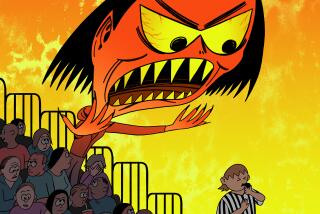Bringing Back Competition for Kids Is a Winner
- Share via
“These are the times that try men’s souls.... What we obtain too cheap, we esteem too lightly; it is dearness only that gives every thing its value.” So starts one of the pamphlets in Thomas Paine’s “The American Crisis.” Although he was speaking of the Revolutionary War, his words ring true in our modern times in a surprising area: raising children.
My children’s first trophies came from YMCA Iddy-Biddy basketball at the age of 4. With the most recent addition of AYSO soccer trophies for my three children, our household now has close to 100. Trophies may mean something to parents -- many of whom were raised when they still had value -- but for my children they aren’t associated with winning, excellence, attendance or even hard work.
You’d be hard-pressed -- in sports or schools -- to know that children have issues with winning and losing. In an effort to make sure no child feels bad, all competitiveness is erased. Just because competition is ignored doesn’t mean it’s not there -- it’s instinctive.
Last year, six high school swimmers, who had been with the local YMCA program since they were 7 years old, worked hard enough to qualify for Y Nationals. You’d think the Y would be ecstatic. Instead, the director said that too much emphasis was placed on these “elite” swimmers. In August he did away with the competitive swim program because someone might feel bad. Excellence was the undoing of a program. After parents complained that all levels of swimmers were participating, and that younger ones needed someone to look up to, he agreed to reinstate a competitive program for the younger children, but no coach was provided for the high school kids. This emphasis on keeping competition to a minimum infects every sport.
Unfortunately, the well-intentioned drive to put all children on the same level also extends into the classroom, thereby requiring the same programs for all children. Second-graders who can multiply and figure out logic problems are still required to do the same simple addition problems as the rest of the class. All students are required to take algebra to graduate, even if their brains aren’t wired that way. A special-education kid who isn’t toilet trained and is blind and partially deaf is in a regular classroom, “mainstreamed” because “we’re all the same.”
It’s the reign of mediocrity and the death of common sense. I laughed at the movie “The Incredibles” because the parents wouldn’t let their son enter sports because he could run too fast. At the end of the movie, they let him enter a race, but he still “dumbed” it down, winning, but only barely. “Diversity” is the catchword for all that’s right, but it’s also the catchword that “dumbs” everything down. In other words, diversity means skin color or religion; it doesn’t actually mean we want people with diverse skills and talents.
When I was in third grade, a spelling contest took the top two winners from each classroom to represent the school in a countywide contest. I didn’t make it and went home crying to my mother. Today, she’d sue the school district and the contest would be banned. Instead, she talked to me about my strengths. We talked about how my best friend had won it and how she was particularly good in that area, how it would be nice if I could cheer her on. My mother took a devastating time for me and made it into a life lesson about an individual’s uniqueness.
Kids can take it. They know who’s smart in class. They also know the smart kid in class may not be the best athlete. The most popular kid may not be the most creative. It’s time to celebrate real differences or at least let them exist. Bring back spelling bees and math contests in elementary school and celebrate the winners. Choose royalty in a school based on a popular vote. Have art contests with real winners. Do away with participation medals, trophies and ribbons.
In life, we lose far more contests than we win, and learning to lose is as valuable as learning to win.


